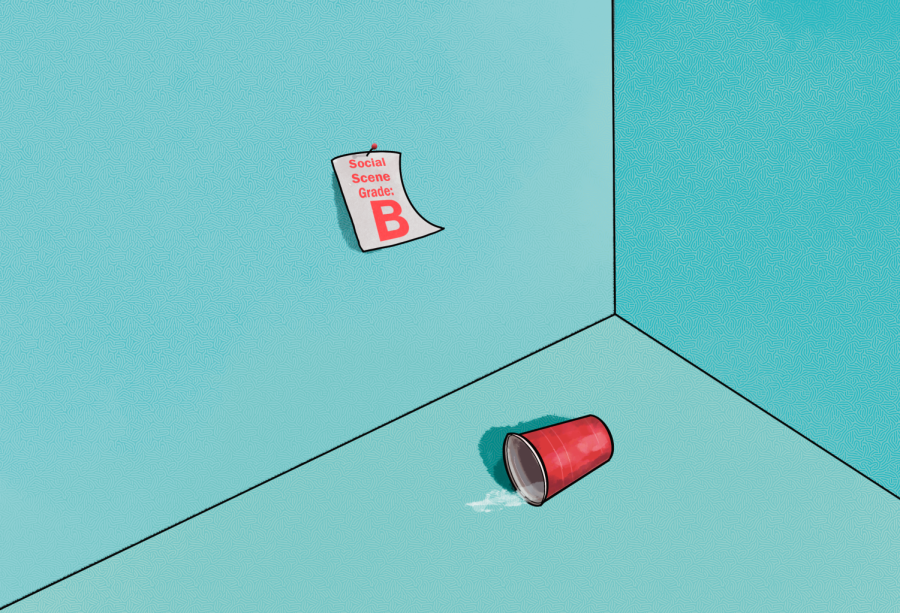Redhawks Reflect on Rambunctious Recreation
An important aspect of college, though difficult to qualify, is a student’s social life. Though this often relies on students’ individual perspectives and numerous circumstantial factors, Seattle University employs different methods of stimulating community engagement. The university offers a number of organizations for students to participate in, including clubs and athletic teams.
Many students have echoed the sentiment that social life is secondary to the university’s emphasis on academics. Student-led college review websites such as Niche and RateMyProfessor both give Seattle U relatively lower scores on party and social scene, receiving a B and 3.2/5 respectively—the lowest rated categories for the university overall.
A prominent difference in Seattle U’s social life from other universities is the distinct absence of Greek life. The university has never officially endorsed nor sponsored Greek life, which was further solidified after the business-centered fraternity Kappa Sigma became inactive on campus.
However, there is now an opportunity for Seattle U students to participate in another independent fraternity not officially supported by the school, but available nonetheless.
The brotherhood of Chi Theta Psi is a Filipino-interest fraternity for students from both Seattle U and the University of Washington. Cameron Mendoza, a first-year psychology student at Seattle U who rushed the fraternity in fall quarter, believes that Greek life has had a powerful and positive influence on his college experience thus far.
“I have met so many more people than I ever thought I would. There is such a large community within Greek life and each organization is spectacular and makes everyone feel included and welcomed,” Mendoza said.
Mendoza also spoke on not only seeking out off-campus activities, but appreciating the university’s environment for what it is. He advised fellow students and incoming first-years to approach community activities with a positive mindset, as Seattle U puts effort into encouraging social growth.
“You get out what you put into it,” Mendoza said.
Kean Gani, a second-year forensic science major and fellow member of Chi Theta Psi, similarly highlighted the positive aspects of the fraternity.
“I know everyone may think of frats as just parties, but my fraternity helped me give back to the Filipino community via opportunities for volunteer work,” Gani said.
Despite the ways in which Gani feels the brotherhood has helped strengthen his social network and professional abilities, he believes that Seattle U should remain free of any official connections to Greek life, noting that it may detract from a focus on the school’s Jesuit tradition.
James Carmody, a first-year computer science major, shared his perspective on how the school’s size affects social life for incoming students. As a result of the school’s small size, Carmody believes there is an emphasis on academics, a sentiment he feels is shared with his peers. However, this also means some students may tend to feel isolated from their peers, choosing to focus on academics or form smaller friend groups rather than having bigger social circles.
“I know a lot of students who describe Seattle U as ‘cliquey,’ and I think that can be attributed to people mostly sticking with their friends rather than participating in open-to-everyone parties,” Carmody said.
Within campus, one of the most popular ways students engage with one another is through athletics. As a member of the men’s crew team, Carmody shared his perspective on how being part of an athletics team impacts social life. He believes that a team environment has had a positive impact on his college experience, and also allowed for intermingling with students in other majors and years—something missing from the routines of many first-year students.
“Looking back at this year, there weren’t many school-affiliated activities that encouraged interaction between the classes. I think that’s a missed opportunity, because in general, upperclassmen have more knowledge about the campus and how to cultivate a positive community,” Carmody said.
He believes that if the university put together events that included students of all ages and grade levels, it would promote cohesive community engagement. He could see this taking the form of opportunities for first-years to meet upperclassmen in their major, or more support for student-led clubs and organizations.
In no small part due to circumstances such as the COVID-19 pandemic and implementation of virtual learning, many students found the transition from high school to university posed unique obstacles—not only academic and personal, but social too. Christopher Fiorello, director of Wellness and Health Promotion at Seattle U, has continued to help students tackle some of these issues.
“Many students have struggled with mental health, loneliness, getting back into the idea of doing classes in person—even relationships have changed. The pandemic has weighed tremendously on a lot of people but college students have had their own struggles,” Fiorello said.
Despite these struggles, Fiorello is hopeful in students’ ability to engage with and support one another. He believes the Seattle U community demonstrates an authentic, genuine care for one another—the most important part of living a healthy social life.
Lucy Sartain, a first-year psychology major, offered their perspective on how taking a gap year influenced their approach to meeting people on campus.
“The gap year made me initially scared to make friends. But honestly, people who want to be friends are out there. You’ve got to take the plunge and be okay with throwing out your first impressions—and asking others to do the same for you,” Sartain said.
Ultimately, although Seattle U lacks the typical indicators of an active collegiate social scene, such as Greek life or an abundant party scene, that does not stop students from partying or participating in the university’s events, programs and clubs.



Joylyn Golondrina
Apr 24, 2022 at 2:48 pm
Great article! Very slay!